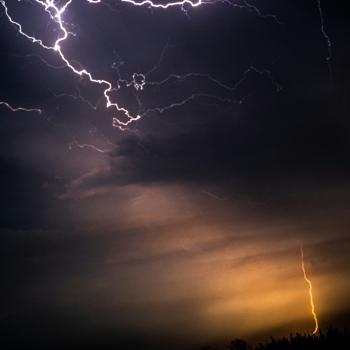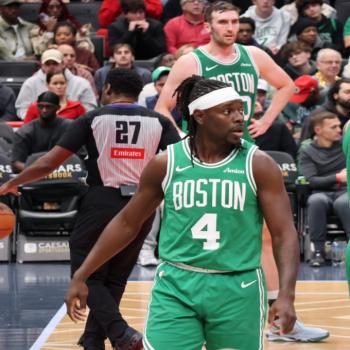I grew up in northern New Jersey, about thirty miles outside of Manhattan; but on September 11, 2001 I was living in Valparaiso, Indiana. I was a long way from home. I felt helpless. A feeling of homesickness came over me. I wanted to return to the place where I grew up and experience a sense of solidarity with those suffering in what New Yorkers call the tri-state area.
During the course of that day, and the several days that would follow, I realized that I was not the only one seeking communion with the people of Manhattan. Students and faculty at Valparaiso University, the school where I was teaching, would stop me in the hall and on the sidewalk to ask me if I knew anyone who was killed in the collapse of the World Trade Center. (I did not.) Others told me that listening to my "New York accent" (which is actually a New Jersey accent) allowed them to feel more connected to what was happening at Ground Zero.
Ten years later, as I reflect back on that day, I realize just how strange it really was. Midwestern Lutherans in Valparaiso, Indiana longed for a sense of communion with urban cosmopolitans and ethnic civil service workers in the "big city." There were no culture wars on September 11th. There was only a sense of our common humanity. And in the immediate wake of the attacks on the World Trade Center and the Pentagon, such a feeling of common humanity quickly took on a nationalist flavor.
That sense of common humanity and national solidarity is gone now, but on Sunday it will be revived—for a moment—in hundreds of acts of commemoration around the country.
I was recently talking about the meaning of September 11, 2001 with a group of Messiah College history majors. We were discussing how, throughout the course of this nation's history, there have been times of both consensus and conflict. The United States, of course, has seen plenty of conflict—the political divisions of the 1790s between Federalists and Republicans, a bloody 19th-century Civil War, the struggle to bring equality to African-Americans and women, the unrest that ensued during the Vietnam era, and our current culture wars over issues such as abortion or gay marriage.
There have also been moments of national unity in American life. Though the founding fathers did not always agree, they were able to convince thirteen disparate British colonies scattered along the eastern seaboard to come together and declare their independence from Great Britain. During the 1940s most of the American people mobilized for war to bring an end to fascism. These and other historical examples reveal that despite our differences, there are certain ideals and values that unite Americans—ideals and values for which Americans have been willing to sacrifice their time, money, and lives to defend. Many have interpreted September 11th as one of those moments.
The founding fathers referred to this kind of personal sacrifice as civic humanism. Many of them believed that in order for the American republic to survive, its people needed to be willing, at times, to sacrifice their personal interests for the greater good of the nation. A republic was more than just a representative form of government. It required a moral citizenry committed to a common purpose. Writing in 1786 about the role of education in a republic, Philadelphia doctor and signer of the Declaration of Independence Benjamin Rush said that schools should be in the business of training "republican machines" willing to place their love of country over their commitment to family, political parties, and the personal accumulation of wealth.
As Christians, we should approach this kind of civic humanism with caution. While the idea of sacrificing one's own interests for some version of the greater good appeals to our better angels, we must remember that the founding fathers understood such sacrifice solely in terms of the United States of America. When they talked about sacrificing for the common good, they meant the common good of the nation. The founders believed that Christianity was good for the republic not because it provided a way for people to go to heaven or draw closer to God and each other, but because it helped to produce the kind of moral, self-sacrificing citizenry needed for the republic to survive. In other words, the founders believed that Christianity was important because it served the state, not the other way around.
Over the course of the last ten years, the events of September 11th have been largely interpreted in such a patriotic and nationalistic way. We have understood the attacks of that day as a threat to an American way of life. The actions taken by the many heroes on that day have been directly connected to their patriotism and willingness to sacrifice for their country.





